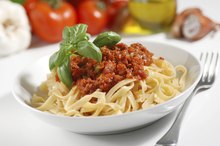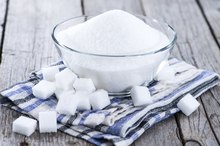What does fact checked mean?
At Healthfully, we strive to deliver objective content that is accurate and up-to-date. Our team periodically reviews articles in order to ensure content quality. The sources cited below consist of evidence from peer-reviewed journals, prominent medical organizations, academic associations, and government data.
The information contained on this site is for informational purposes only, and should not be used as a substitute for the advice of a professional health care provider. Please check with the appropriate physician regarding health questions and concerns. Although we strive to deliver accurate and up-to-date information, no guarantee to that effect is made.
Can Carbs and Sugar Cause Acid Reflux?
Gastroesophageal reflux, or acid reflux, happens when the contents of your stomach rise back up into your esophagus. A number of lifestyle and dietary factors contribute to this uncomfortable condition, including when, how and what you eat. Although sugar and carbohydrates don't cause acid reflux, you might experience symptoms if you overeat these foods, particularly if you do so shortly before bedtime.
If you are experiencing serious medical symptoms, seek emergency treatment immediately.
Acid Reflux and Nutrition
You might be able to control acid reflux symptoms by avoiding certain foods and beverages, advises the National Digestive Diseases Information Clearinghouse. These include:
- greasy foods
- spicy foods
- peppermint
- caffeinated beverages
- chocolate
- alcohol
The Stanford University Medical Center also recommends avoiding citrus fruits and juices and fatty or oily foods 1. Sugar and carbohydrates do not seem to directly trigger acid reflux, however.
Overeating, Mealtimes and Obesity
Carbohydrate Needs in Children
Learn More
Even though sugar and carbohydrates don't cause acid reflux, they still can contribute to your symptoms in a few ways. Just as eating excessively large meals can cause acid reflux, you might experience symptoms if you overeat foods high in sugar or carbs. In addition, overconsumption can lead to obesity, another risk factor for acid reflux. Also, avoid eating sugar, carbs and other foods within two to three hours of bedtime to help prevent acid reflux.
- Even though sugar and carbohydrates don't cause acid reflux, they still can contribute to your symptoms in a few ways.
- Just as eating excessively large meals can cause acid reflux, you might experience symptoms if you overeat foods high in sugar or carbs.
Related Articles
References
- Stanford University Medical Center: Nutrition Guidelines for Gastroesophageal Reflux (GERD)
- Acid reflux (GER and GERD) in adults. (n.d.). niddk.nih.gov/health-information/digestive-diseases/acid-reflux-ger-gerd-adults
- Cleveland Clinic. (2018). Lifestyle Guidelines for the Treatment of GERD. https://my.clevelandclinic.org/health/articles/15530-lifestyle-guidelines-for-the-treatment-of-gerd
- Diet changes for GERD. (2017). aboutgerd.org/diet-lifestyle-changes/diet-changes-for-gerd.html
- Kahrilas P, et al. (2017). Emerging dilemmas in the diagnosis and management of gastroesophageal reflux disease. DOI: 10.12688/f1000research.11918.1
- Kubo A, et al. (2009). Effects of dietary fiber, fats, and meat intakes on the risk of Barrett’s esophagus. DOI: 10.1080/01635580902846585
- Nutrition Care Manual. Academy of Nutrition and Dietetics. Gastroesophageal Reflux.
Writer Bio
Matthew Lee has been writing professionally since 2007. Past and current research projects have explored the effect of a diagnosis of breast cancer on lifestyle and mental health and adherence to lifestyle-based (i.e. nutrition and exercise) and drug therapy treatment programs. He holds a Master of Arts in psychology from Carleton University and is working toward his doctorate in health psychology.









